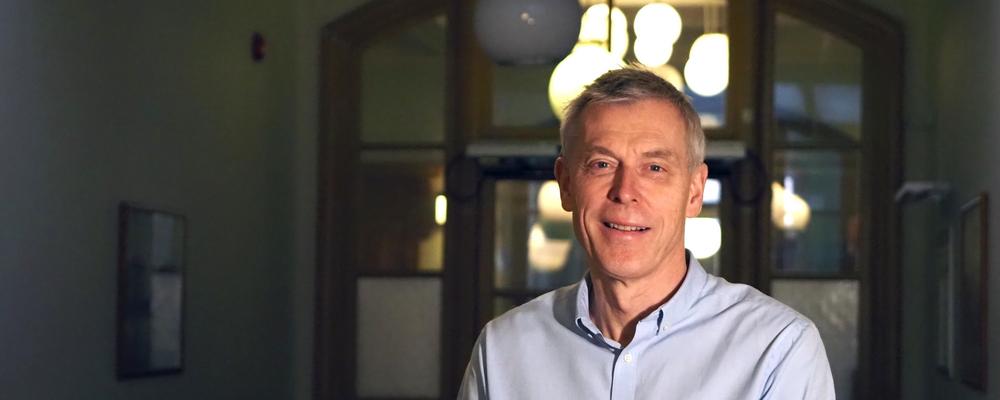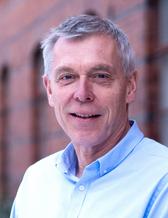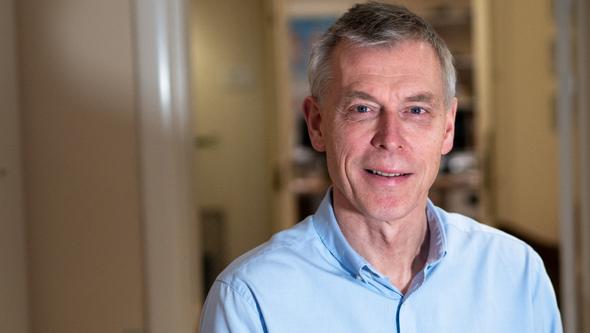
- Home
- Research
- Find research
- Lars Kölby on his dissertation: “I remember the taste of doom”
Lars Kölby on his dissertation: “I remember the taste of doom”
He recalls the fear. “I was led into the room like an animal ready for slaughter. I thought: Now, I will be exposed as a complete fraud, humiliating myself, my family, and my supervisor.” Halfway through the dissertation defense, everything turned for Lars Kölby. It all transformed into euphoria that lasted for a month.
He is a professor of plastic surgery and head of department. Lars Kölby’s research focuses on craniofacial surgery and innovative 3D printing of tissue.
Part of his job is supervising doctoral students.
“I find it terribly enjoyable. There’s one thing that is the real reward for me as a supervisor. And it repeats itself time and again,” says Lars Kölby, adding:
“It happens about a month before the dissertation. That’s when the doctoral students ignite on all cylinders. They come in and out of my office with one reference article after another. ‘Look here, Lars! They did this. They understand nothing. And look here. They did it this way. That’s completely wrong! But we did it this way. It’s so much better'.”

Seeing doctoral students explode, that’s the joy
What do you feel then?
“You know, seeing how doctoral students just explode in the final stretch. That’s the joy. It’s fantastic. Then I understand that I have contributed to lifting them from one level to another.”
“A total high, like a rush”
How do you personally remember the last weeks of your own doctoral project?
“It was a total high. Like a rush. And that rush consisted of two parts. The first came when I was nearing the completion of the thesis. I lived in Trollhättan then and commuted. I sat up late at home, writing.”
Lars Kölby continues:
“My wife and kids had gone to bed long ago. It was maybe around 1 am. I sat there typing. Finally, I couldn’t take it anymore. I went to have a shower.”
As the warm water spouted against him, something happened.
“Just a moment ago, I had been completely exhausted sitting at the computer, barely able to stand up. But now, it just began flowing with good ideas, one after another. About what I should do with the text, and new experiments. I just stood there in the shower. It was very pleasant. It was feeding into my head.”
“I’ll have to find another job”
Then came the day of Lars Kölby’s dissertation defense, in December 1999.
“The last few hours before, I had a feeling of catastrophe. I can still taste it. The taste of doom. ‘I won’t make it.’ I seriously thought about what I would do next if I couldn’t continue. ‘We’ll have to solve it. I’ll have to try to find another job somewhere’.”
He remembers the feeling and thoughts as he was about to enter the pathologist’s auditorium.
“When we walked toward the door, it was something absolutely terrible. I was led into the room like an animal ready for slaughter. I thought: ‘I will be exposed as a complete fraud. I will humiliate myself, my family, my mother and father, my supervisor. The entire University of Gothenburg will be dragged through the mud by what is about to happen now’.”

The transformation of emotions
But didn’t you have confidence in knowing that you had done good work?
“There’s nothing wrong with my self-confidence. I had prepared quite well. I had gone through all possible questions I could get. Intellectually, I knew it. But not emotionally. It was such tension.”
There was one question, in particular, that Lars Kölby had prepared extra hard for. One he hoped to get from the opponent.
If the opponent asks that question, he has only himself to blame
“If that question came, I knew exactly what to answer. Then I would have the chance to tie together all my sub-studies. I had thought: ‘If he asks that question, he has only himself to blame! Because then I’ll run the race, then I’ll take the long answer’.”
Did you get that very question?
“Yes. That question came, maybe halfway through the defense.”
Then it kicked in, the transformation of emotions. First in the feet.
“It was totally physical. I pushed the chair back to look at my feet, if you could see anything. Had they swollen? Or burst? It was like a wave slowly spreading. After a few minutes, that feeling had risen to the calves. And after that, to the knees. Then to the thighs, and the stomach. It was very strange. Then it jumped to the chest. Finally, it reached the head. Bing! The second half of the public defense was like a triumphal march,” says Lars Kölby, clarifying:
“So, my feeling was triumph. But I was probably quite bad. It is likely that I did a highly mediocre dissertation defense.”
Ecstatic for a month afterward
How did you feel afterward?
“People had said that you should be so down after your dissertation. I was ecstatic for an entire month straight. Around the clock. It was very strange.”
The memory of those feelings makes Lars Kölby reconnect with the doctoral students he supervises.
“When they come to me in the final phase before the public defense, when they rev up. When they go at full speed, everywhere, working day and night. It’s so... It’s so fantastic. And practically everyone does this. Otherwise, it’s pointless.”
Text: Jakob Lundberg